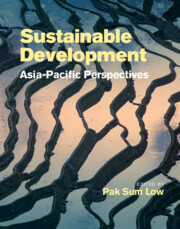Book contents
- Sustainable Development: Asia-Pacific Perspectives
- Sustainable Development: Asia-Pacific Perspectives
- Copyright page
- Dedication
- Contents
- Notes on contributors
- Peer reviewers
- Editor’s note
- Foreword
- Foreword
- Foreword
- Foreword
- Foreword
- Environmental keystones: Remembering Dr Mostafa Kamal Tolba
- Remembering Dr Mostafa Kamal Tolba
- Remembering Dr Mostafa Kamal Tolba
- Acronyms and abbreviations
- SI prefixes
- Unit abbreviations
- Chemical formulae
- Part I Sustainable Development: Theories and Practices
- 1 Asian identities
- 2 On sustainable development
- 3 Sustainability: A scientific dilemma
- 4 Respect and reward: Ecology from the Analects of Confucius
- 5 Sustainable development from an East-West integrative perspective: Eastern culture meets Western complexity theory
- 6 Sustainable urbanism: Measuring long-term architectural merit
- 7 Sustaining wooden architectural heritage
- 8 Green development in China
- 9 Bhutan’s sustainable development initiatives and Gross National Happiness
- 10 A different form of sustainable development in Thailand and Bhutan: Implementation of a sufficiency approach
- 11 The sustainability of food production in Papua New Guinea
- 12 Education for sustainable development: An overview of Asia-Pacific perspectives
- 13 A placemaking framework for the social sustainability of master-planned communities: A case study from Australia
- 14 Poverty, inequity, and environmental degradation: The key issues confronting the environment and sustainable development in Asia
- 15 The challenge of global climate change for international law: An overview
- 16 Sustainable development and climate change negotiations: Perspectives of developing countries
- Part II Sustainable Development: Challenges and Opportunities
- Index
- Endmatter
- References
5 - Sustainable development from an East-West integrative perspective: Eastern culture meets Western complexity theory
from Part I - Sustainable Development: Theories and Practices
Published online by Cambridge University Press: 23 December 2021
- Sustainable Development: Asia-Pacific Perspectives
- Sustainable Development: Asia-Pacific Perspectives
- Copyright page
- Dedication
- Contents
- Notes on contributors
- Peer reviewers
- Editor’s note
- Foreword
- Foreword
- Foreword
- Foreword
- Foreword
- Environmental keystones: Remembering Dr Mostafa Kamal Tolba
- Remembering Dr Mostafa Kamal Tolba
- Remembering Dr Mostafa Kamal Tolba
- Acronyms and abbreviations
- SI prefixes
- Unit abbreviations
- Chemical formulae
- Part I Sustainable Development: Theories and Practices
- 1 Asian identities
- 2 On sustainable development
- 3 Sustainability: A scientific dilemma
- 4 Respect and reward: Ecology from the Analects of Confucius
- 5 Sustainable development from an East-West integrative perspective: Eastern culture meets Western complexity theory
- 6 Sustainable urbanism: Measuring long-term architectural merit
- 7 Sustaining wooden architectural heritage
- 8 Green development in China
- 9 Bhutan’s sustainable development initiatives and Gross National Happiness
- 10 A different form of sustainable development in Thailand and Bhutan: Implementation of a sufficiency approach
- 11 The sustainability of food production in Papua New Guinea
- 12 Education for sustainable development: An overview of Asia-Pacific perspectives
- 13 A placemaking framework for the social sustainability of master-planned communities: A case study from Australia
- 14 Poverty, inequity, and environmental degradation: The key issues confronting the environment and sustainable development in Asia
- 15 The challenge of global climate change for international law: An overview
- 16 Sustainable development and climate change negotiations: Perspectives of developing countries
- Part II Sustainable Development: Challenges and Opportunities
- Index
- Endmatter
- References
Summary
Sustainable development as a concept and a practice has much to gain through an integration of traditions of thought culture. This entails cultivating the holistic approach found in Eastern philosophy and culture, while still valuing the analytical Western contribution. The conceptual catalyst for this to occur is an emerging ‘tradition’ of thought: complexity theory. More specifically, complex adaptive systems, or CAS, represent a Western match to Eastern thinking. Therefore it is possible to have an integrative perspective, without having to privilege Western cultural perspectives on development, nor upturn them in favour of alternative models of development. The integrative or holistic model can work well for incorporating diverse approaches. This also appears to be Chinese President Xi Jinping’s message when he conveys the Chinese approach to development in his ‘common destiny’ speeches. India’s pluralistic traditions also sit well with the idea of ‘the one and the many’ and of the harmony of opposites.
- Type
- Chapter
- Information
- Sustainable Development: Asia-Pacific Perspectives , pp. 36 - 41Publisher: Cambridge University PressPrint publication year: 2022
References
- 1
- Cited by

